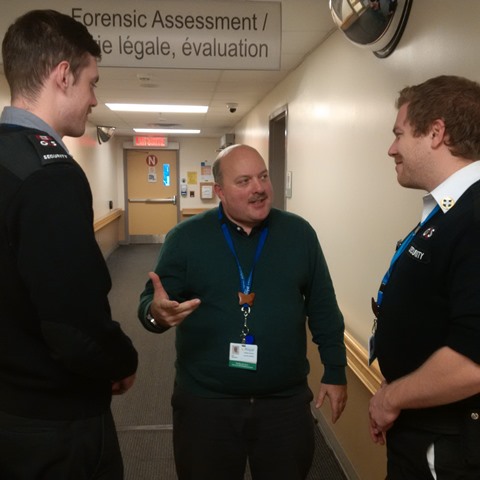By Sam Asselstine, CHPA
Who are they, what can they do and how can they help?
Before I found myself fully submerged in the security industry I used to wonder what security staff did all day. What I usually saw were people in uniforms standing around, sometimes in groups who appeared to be waiting for something to happen. Sound familiar? I didn’t wonder what other first responders did all day, I seemed to know or at least thought I knew. Fire, police and paramedics all have highly identifiable roles leaving no question in mind. In healthcare it is no different. For instance, the role of a registered nurse was clear to me. As were the roles of doctors, cleaners, porters, social workers, clerical staff and such – all very important roles dedicated to ensuring the highest possible level of patient centred care. But then, I saw these people in uniforms on the sidelines and I was unsure of what they were there to do.
Who are they?
Healthcare security professionals (HSP) come from a variety of backgrounds and their credentials vary. In some cases the industry is chosen by those embarking on a second career after retiring from law enforcement. Other healthcare security professionals are fresh college graduates from emergency management, police foundations or private security and investigations programs, usually looking for work experience before moving on to their long-term career goals. And then, there are some who have not done either, simply looking for long-term employment, who happen to meet the basic minimum requirements to be licensed. The main question for me was what makes these people healthcare security professionals instead of just – again – people in uniforms who happen to work in a hospital. Some healthcare organizations hire just that – security guards to work in their hospitals. The training requirements are weak, and the role of the guard is unclear or at times unnecessary. This is a type of worst case scenario for the person who has been sent to work in a uniform, leading to embarrassing situations usually at the front doors of the facility. This person in uniform is not a healthcare security professional. Although well-intentioned this person is not ready for what’s in store for them in a hospital – where 40 per cent of workers report being assaulted. The best healthcare security programs hire a mix of talent possessing education and experience, with internal annual training re-certification. The best programs conduct semi-annual reviews of the Standard Operating Procedures and include security staff in the hospital new-hire-orientation process.
What can they do?
Generally speaking, HSPs have no different power or authority than anyone else. This was another question I always had – “If I get wrapped up with these guys what can they do to me?” As said before, some have no training at all – which is a very dangerous situation for the guard as well as the public they are hired to serve. A well trained HSP is trained in resistance management, crisis management, effective communications, Criminal Code applications, first aid and CPR, sharp edge weapon defense, emergency management and has completed a comprehensive on-site training program that includes the hospital’s mission, vision and values as well as the organizational structure of the hospital. The aforementioned is not an inclusive list and different hospitals ask for varying criteria – some expansive and some extremely limited. A growing trend is having healthcare security staff acting as Special Constables with Peace Officer Status. Although not practiced widely across Ontario the concept has picked up steam elsewhere across Canada. These highly trained guards are usually found in supervisory positions and have received next level training at a provincial law enforcement training entity.
How can they help?
Well, how they can help will be determined by two things
- Their level of training, and
- How their role is defined within the hospital.
If their role is supported and defended by the hospital as ” a customer service ambassador” you can be assured that this HSP has the patient in mind. True HSPs are able to assist in Team Huddles as well as Patient Interventions – all the while taking direction and advice from a Clinical Lead. HSPs often have a bridge role within the facility they serve. Assisting various departments in many ways 24/7. Helping environmental services clean up a flood, assisting maintenance with a broken down elevator and walking nursing staff to their vehicles at shift change are all common duties. More and more, HSPs are found in the centre of the circle of care, as patient safety and security is a paramount focus.
Sam Asselstine, CHPA is a Certified Healthcare Protection Administrator and is an Executive Member of the Ontario Chapter for the International Association of Healthcare Security and Safety.




